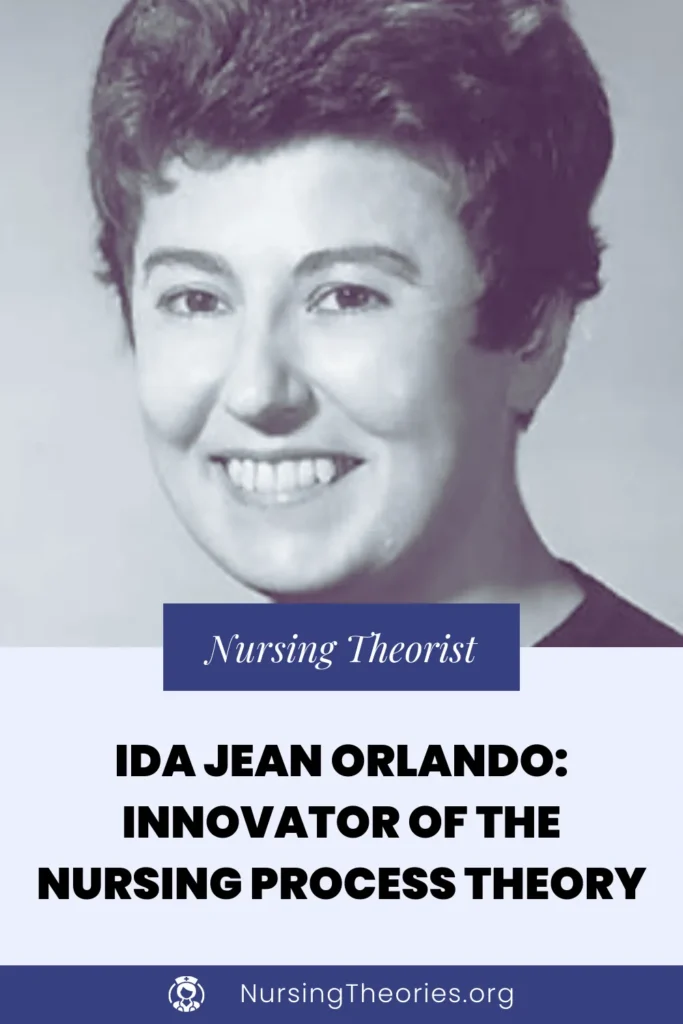Ida Jean Orlando, a highly influential nurse theorist and educator, is renowned for her development of the Deliberative Nursing Process Theory.
Her theory revolutionized nursing practice by emphasizing the importance of individualized patient care through a dynamic, problem-solving approach.
Orlando’s contributions helped establish the nursing process as a fundamental aspect of modern nursing practice, ensuring that nurses address patient needs through continuous assessment and deliberate action.
In this article, we cover Ida Jean Orlando’s life, achievements, philosophy, and lasting impact on modern nursing.

Quick Summary
- Developed the Deliberative Nursing Process Theory, emphasizing dynamic nurse-patient interactions and individualized care.
- Introduced a problem-solving approach that guides nurses in assessing and responding to patient needs.
- Authored key works on nursing practice, influencing nursing curricula worldwide.
- Promoted the idea of patient involvement in care planning and decision-making.
- Recognized globally for her role in establishing the nursing process as a cornerstone of modern nursing.
Early Life and Background of Ida Jean Orlando

Birth and Family Background of Ida Jean Orlando
- Ida Jean Orlando was born in 1926 in New York City, into a family that valued education and hard work.
- Her early experiences in a close-knit community instilled in her a strong sense of empathy and service, which would later guide her nursing career.
Education and Early Influences in Orlando’s Life
- Orlando began her nursing education at New York Medical College, earning her nursing diploma.
- She pursued further studies, earning a bachelor’s degree in public health nursing from St. John’s University and a master’s degree from Teachers College, Columbia University.
- Her experiences in public health nursing, coupled with her academic studies, shaped her understanding of patient-centered care and problem-solving.
Ida Jean Orlando’s Philosophy and Vision for Nursing
- Orlando believed that effective nursing involves more than performing tasks; it requires understanding and addressing the patient’s immediate needs through observation and communication.
- Her vision emphasized that nurses must continuously assess patient behavior and interpret verbal and nonverbal cues to provide appropriate care.
- Famous quote: “The patient’s behavior is the starting point, and the nurse’s reaction to that behavior is the most important factor in determining the nursing intervention.”
Ida Jean Orlando’s Education and Early Nursing Career
Formal Education and Nursing Training of Ida Jean Orlando
- Orlando’s formal education in nursing, public health, and behavioral sciences provided her with a multidisciplinary perspective on patient care.
- Her academic background enabled her to develop a theory that bridges the gap between theory and clinical practice.
Early Professional Experiences in Orlando’s Career
- Orlando worked as a staff nurse and later as a mental health specialist, gaining valuable experience in understanding patient behaviors.
- Her experiences in psychiatric and public health nursing highlighted the importance of individualized care and led her to explore dynamic nurse-patient interactions.
Key Achievements and Contributions of Ida Jean Orlando
Development of the Deliberative Nursing Process Theory
- Orlando’s theory emphasizes that nurses must use critical thinking and observation to identify and address patient needs. The key components of the theory include:
- Patient Behavior: Nurses begin by observing the patient’s verbal and nonverbal cues.
- Nurse Reaction: The nurse responds to the patient’s behavior, validating observations and concerns.
- Nursing Action: Based on the validated assessment, the nurse provides appropriate interventions.
- Evaluation: The nurse continuously evaluates the effectiveness of interventions to ensure the patient’s needs are met.
- The theory focuses on ensuring that nursing interventions are deliberate and purposeful, avoiding unnecessary or ineffective actions.
Contributions to Nursing Education and Curriculum Development
- Orlando integrated her theory into nursing education, emphasizing the importance of critical thinking, assessment, and patient involvement.
- She designed teaching methods that prepare nurses to recognize and respond to patients’ unique needs dynamically.
Research and Theoretical Advancements
- Orlando conducted research on nurse-patient interactions, demonstrating that deliberate and individualized care leads to better outcomes.
- Her studies provided empirical support for the nursing process as an essential tool in patient-centered care.
Global Impact and Recognition
- Orlando’s theory has been adopted in nursing education and practice globally, influencing how nurses assess and respond to patient needs.
- She received numerous awards and honors for her contributions to nursing theory and education.
Overview of Ida Jean Orlando’s Deliberative Nursing Process Theory
- The theory focuses on dynamic nurse-patient interactions, where nurses continuously assess and validate patient needs before taking action.
- By fostering individualized and deliberate care, the theory ensures that nursing interventions are effective and patient-centered.
- To explore this theory in greater depth, visit the in-depth article on the Deliberative Nursing Process Theory.
Notable Publications by Ida Jean Orlando
- The Dynamic Nurse-Patient Relationship – A foundational text that outlines her theory and its applications in clinical practice.
- Nursing Process and Behavioral Dynamics – A work that emphasizes the role of observation and assessment in nursing care.
- Numerous research articles on nurse-patient interactions, problem-solving, and nursing education.
Challenges and Criticisms of Ida Jean Orlando’s Work
Challenges in Applying the Theory in Fast-Paced Environments
- Some nurses have found it challenging to apply the theory in fast-paced or emergency settings where quick decisions are necessary.
- Orlando advocated for adapting the theory to different clinical contexts without compromising its core principles.
Criticisms of the Subjective Nature of the Theory
- Critics argue that the reliance on patient cues and nurse interpretations can lead to variability in care.
- However, proponents highlight that individualized care often results in more effective and satisfying outcomes for patients.
Timeline of Major Milestones in Ida Jean Orlando’s Life
- 1926: Born in New York City.
- 1954: Earned her master’s degree from Teachers College, Columbia University.
- 1958: Developed the Deliberative Nursing Process Theory.
- 1961: Published The Dynamic Nurse-Patient Relationship.
- 1970s: Integrated her theory into nursing education globally.
- 2007: Passed away, leaving a lasting legacy in nursing theory and education.
Legacy and Lasting Impact of Ida Jean Orlando
Impact on Nursing Practice and Patient Care
- Orlando’s theory has improved nursing assessments and interventions by emphasizing individualized, problem-focused care.
Global Influence and Recognitions
- Her work is taught in nursing schools worldwide and applied in various healthcare settings.
- Orlando’s contributions have earned her numerous posthumous honors and recognitions.
Final Years and Passing of Ida Jean Orlando
- Orlando continued to mentor students and contribute to nursing research until her passing in 2007.
- Her legacy lives on through the widespread application of her theory in nursing education and practice.
Key Lessons from Ida Jean Orlando for Modern Nursing
- Deliberate decision-making: Effective care requires purposeful actions based on validated patient needs.
- Patient-centered care: Individualized care leads to better outcomes and patient satisfaction.
- Observation and assessment: Continuous assessment is essential for meeting patients’ changing needs.
- Nurse-patient interaction: Communication and trust between nurses and patients are key to successful care.
- Adaptability: Nurses should tailor their approaches to different clinical settings while maintaining core principles.
Conclusion
Ida Jean Orlando’s Deliberative Nursing Process Theory redefined nursing by emphasizing dynamic, problem-focused interactions between nurses and patients.
Her work, explored further in the in-depth article on the Deliberative Nursing Process Theory, continues to guide modern nursing practice.
Orlando’s legacy endures as her theory remains a cornerstone of effective, patient-centered care worldwide.


